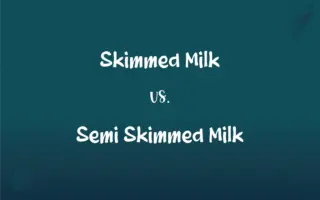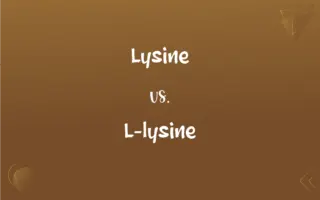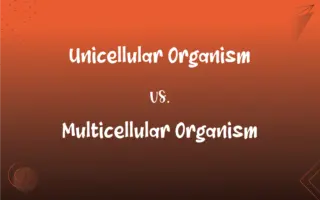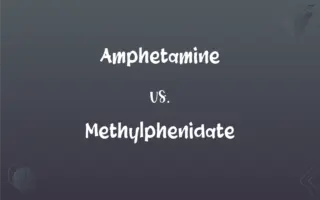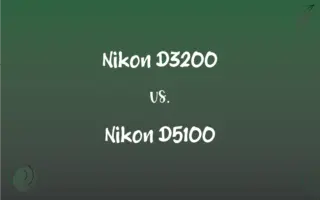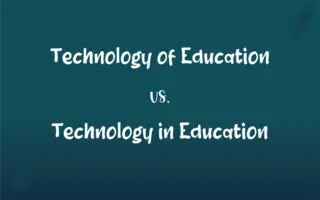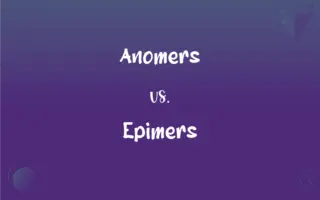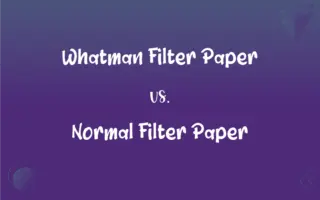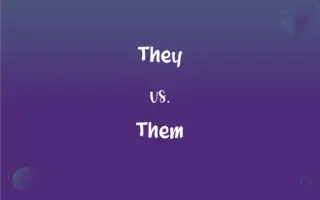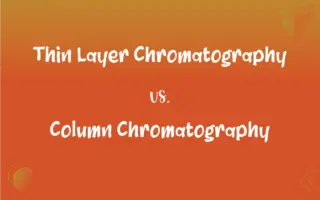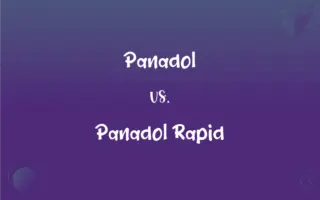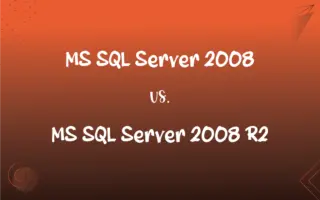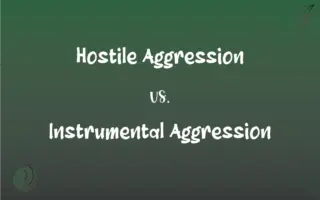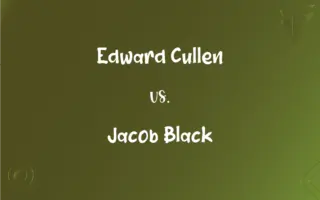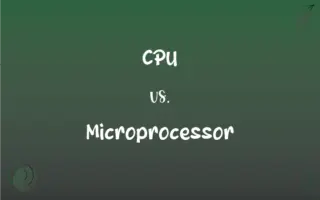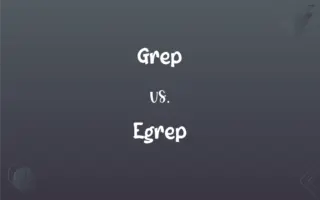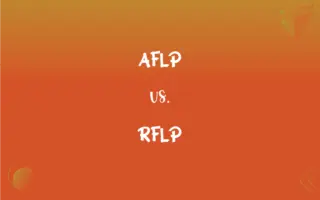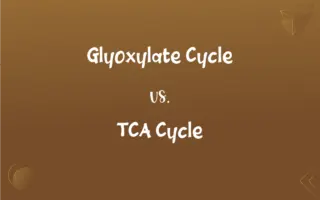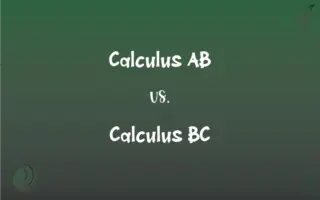Descriptive Grammar vs. Prescriptive Grammar: What's the Difference?
Edited by Aimie Carlson || By Harlon Moss || Updated on October 10, 2023
Descriptive grammar studies how language is actually used, while prescriptive grammar dictates how language should be used.

Key Differences
Descriptive grammar observes and records language patterns as they are naturally used in speech and writing. In contrast, prescriptive grammar sets rules and standards for how language should be used, often based on traditional norms.
Descriptive grammar doesn't make judgments about right or wrong language use; instead, it aims to understand language as it evolves and changes. On the other hand, prescriptive grammar, by its very nature, sets standards and often labels certain usages as "incorrect" or "improper."
For linguists studying language, descriptive grammar offers a more objective look at the intricacies of language patterns, dialects, and linguistic shifts. Conversely, prescriptive grammar is often associated with formal writing, education, and institutions that uphold language standards.
In daily conversations, people often unconsciously use descriptive grammar, employing colloquialisms, slang, and regional dialects. Meanwhile, prescriptive grammar rules are what many of us are taught in school, where deviations from the "standard" can be marked as errors.
Descriptive grammar embraces the richness and diversity of language, recognizing that language is a living entity, constantly evolving. Prescriptive grammar, on the other hand, serves as a guide to maintain clarity and uniformity, especially in formal contexts.
ADVERTISEMENT
Comparison Chart
Purpose
Observes and records language usage
Dictates how language should be used
Judgment
Non-judgmental
Often labels certain usages as "incorrect"
Use in Daily Life
Reflects everyday speech patterns
Reflects formal, standardized language
Associated With
Linguistic research, dialect studies
Formal writing, education
Response to Language Evolution
Embraces linguistic changes
Resists deviations from established norms
ADVERTISEMENT
Descriptive Grammar and Prescriptive Grammar Definitions
Descriptive Grammar
Descriptive grammar often observes colloquialisms and slang.
Modern descriptive grammar includes internet slang in its observations.
Prescriptive Grammar
This approach can label certain usages as "errors."
Prescriptive grammar marks 'ain't' as non-standard.
Descriptive Grammar
This approach doesn't label language use as right or wrong.
According to descriptive grammar, ending a sentence with a preposition isn't inherently incorrect.
Prescriptive Grammar
Prescriptive grammar upholds traditional language norms.
Many editors rely on prescriptive grammar for publishing consistency.
Descriptive Grammar
Descriptive grammar is an objective study of language use.
Her study on descriptive grammar revealed regional variations in pronunciation.
Prescriptive Grammar
Prescriptive grammar sets language rules and standards.
Schools often teach prescriptive grammar to maintain writing standards.
Descriptive Grammar
It seeks to understand language patterns and shifts.
Through descriptive grammar, linguists observed the rise of singular 'they'.
Prescriptive Grammar
It dictates how language "should" be used.
According to prescriptive grammar, split infinitives are to be avoided.
Descriptive Grammar
It focuses on how language is naturally spoken and written.
Descriptive grammar recognizes 'y'all' as a common contraction in Southern American English.
Prescriptive Grammar
It aims for clarity and uniformity in language.
Prescriptive grammar guidelines prevent ambiguity in formal documents.
FAQs
Can prescriptive grammar change over time?
Yes, rules can evolve based on language shifts and societal changes.
Does descriptive grammar judge language use?
No, it observes language without deeming it right or wrong.
Which grammar focuses on dialects and regional speech?
Descriptive grammar.
Why is prescriptive grammar taught in schools?
To establish and maintain language standards in formal writing.
Can one be knowledgeable in descriptive grammar but not prescriptive (and vice versa)?
Yes, expertise in one doesn't automatically imply expertise in the other.
What's the main goal of descriptive grammar?
To observe and understand how language is naturally used.
How does descriptive grammar view non-standard dialects?
It observes and values them as genuine representations of language use.
Is one grammar better than the other?
Neither is "better"; they serve different purposes in language study and use.
Can prescriptive grammar rules be broken?
Yes, especially in casual contexts or for stylistic choices.
How do linguists generally view descriptive grammar?
As a valuable tool to study language objectively.
Are all language rules based on prescriptive grammar?
No, many rules stem from observing consistent patterns in usage.
Does descriptive grammar support slang and colloquialisms?
Yes, it observes all forms of language, including slang.
Why might someone prefer prescriptive grammar?
For clarity, consistency, and adherence to traditional language standards.
Are grammar rules always prescriptive?
No, many rules emerge from observed patterns, not dictated standards.
What's the primary criticism of prescriptive grammar?
It's seen as limiting and not always reflective of real-life language use.
How do most dictionaries approach grammar?
They often blend both descriptive and prescriptive elements.
Why do some people criticize prescriptive grammar?
It's seen as rigid and resistant to natural language evolution.
Why is descriptive grammar important?
It captures the richness and diversity of language in real-life contexts.
How do style guides relate to prescriptive grammar?
Style guides often embody prescriptive rules tailored for specific publications or fields.
Does descriptive grammar support the evolution of language?
Yes, it embraces and documents linguistic changes.
About Author
Written by
Harlon MossHarlon is a seasoned quality moderator and accomplished content writer for Difference Wiki. An alumnus of the prestigious University of California, he earned his degree in Computer Science. Leveraging his academic background, Harlon brings a meticulous and informed perspective to his work, ensuring content accuracy and excellence.
Edited by
Aimie CarlsonAimie Carlson, holding a master's degree in English literature, is a fervent English language enthusiast. She lends her writing talents to Difference Wiki, a prominent website that specializes in comparisons, offering readers insightful analyses that both captivate and inform.
















